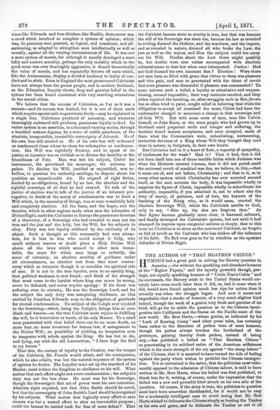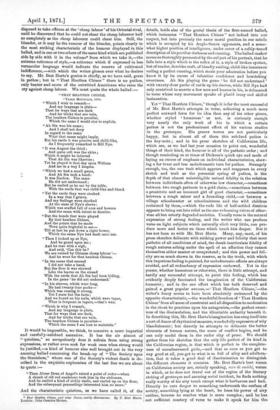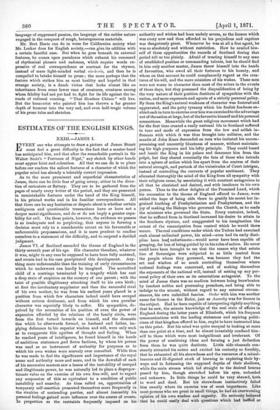THE AUTHOR OF "THAT HEATHEN CHI - NEE." UMOUR had a great
part in solving the Slavery question in America ;—for without the sparkling and abundant humour of the " Biglow Papers," and the equally powerful though, per- haps, not equally sparkling humour of "Uncle Tom's Cabin" and its successors, the Slavery crisis in the United States would cer- tainly have come much later than it did, or, had it come when it did, would have found opinion much less ripe for action than it actually was when the struggle began. And now it seems not improbable that a stroke of humour, of a very much slighter kind indeed, though the work of a genius very fresh and genuine of its kind, will go far to settle the question as to the Chinese immi- gration into California and the States on the Pacific coast of the new world. Mr. Bret Harte,—whose genius, as indicated by his "Luck of Roaring Camp" -and other prose tales, has certainly been rather in the direction of pathos than of mere humour, though his pathos always touches the borderland of the grotesque, gaining thereby fresh pathos, instead of losing any,—has published a ballad on "That Heathen Chinee " so penetrating in its subdued satire of the American selfishness which is the main strength of the cry against "the cheap labour" of the Chinese, that it is asserted to have turned the tide of feeling against the party which wishes to prohibit the Chinese immigra- tion. Yet so restrained is the satire, that the politician most vehe- mently opposed to the admission of Chinese labour, is said to have written to Mr. Bret Harts, when his ballad was first published, to thank him for it, writing, of course, under the impression that the ballad was a new and powerful blow struck on his own side of the question. Of course, if the story is true, the politician in question must have been somewhat thickheaded, for it would not be easy for a moderately intelligent man to avoid seeing that Mr. Bret Harte wished to delineate the Chinese simply as beating the Yankee at his own evil game, and to delineate the Yankee as not at all disposed to take offence at the cheap labour' of his Oriental rival, until he discovered that he could not cheat the cheap labourer half so completely as the cheap labourer could cheat him. Still, the blander, or it may be the rumour of the blunder, points clearly to the most striking characteristic of the humour displayed in this ballad, and in one or two others of the same kind which are published side by side with it in the volume* from which we take it,—the extreme reticence of style,—a reticence which if expressed in less vernacular language would indicate the reserve of cultivated indifference,—with which the writer glosses over what he desires to say. Mr. Bret Harte's genius is chiefly, as we have said, great in pathos ; but in "That Heathen Chines" there is no pathos, only banter and scorn of the outwitted Americans who raise the cry against cheap labour. We must quote the whole ballad :-
"THAT HEATHEN CHINEE.
"TABLE MOUNTAIN, IRO.
"Which I wish to remark— And my language is plain—
That for ways that are dark And for tricks that are vain, The heathen Chinee is peculiar, Which the same I would rise to explain.
"Ah Sin was his name ; And I shall not deny In regard to the same What that name might imply, But his smile it was pensive and child-like, As I frequently remarked to Bill Nye.
"It was August the third ; And quite soft was the skies ; Which it might be inferred That Ah Sin was likewise ; Yet he played it that day upon William And me in a way I despise.
"Which we had a small game, • And Ah Sin took a hand: It was Euchre. The same He did not understand ; But he smiled as he sat by the table, With the smile that was child-like and bland.
"Yet the cards they were stocked In a way that I grieve, And my feelings were shocked At the state of Nye's sleeve : Which was stuffed full of aces and bowers And the same with intent to deceive.
"But the hands that were played By that heathen Chinee, And the points that he made
Were quite frightful to see—
Till at last he put down a right bower, Which the same Nye had dealt unto me.
"Then I looked up at Nye, And he gazed upon me ; And he rose with a sigh, And said, 'Can this be?
We are ruined by Chinese cheap labour'—
And he went for that heathen Chinee.
"In the scene that ensued I did not take a hand, But the floor it was strewed Like the leaves on the strand With the cards that Ah Sin had been hiding, In the game he did not understand.'
"In his sleeves, which were long,
He had twenty-four packs—
Which was coming it strong, Yet I state but the facts ; And we found on his nails, which were taper, What is frequent in tapers,—that's wax.
"Which is why I remark, And my language is plain, That for ways that are dark, And for tricks that are vain,
The heathen Chinee is peculiar—
Which the same I am free to maintain."
It would be impossible, we think, to conceive a more impartial and carefully-subdued narrative. It has the air almost of "quietism," so scrupulously does it refrain from using strong expressions, or rather even seek for weak ones when strong would be justified,—a kind of humour also well brought out in the very amusing ballad concerning the break-up of "The Society upon the Stanislaus," where one of the Society's violent death is de- cribed in the exquisite euphemism of the last line we are about to quote :—
" Then Abner Dean of Angel's raised a point of order—when A chunk of old red sandstone took him in the abdomen, And he smiled a kind of sickly smile, and curled up on the floor, And the subsequent proceedings interested him no more."
And the characteristic quietism, as we have called it, of the
• Thai Ileathen Chinee, and other Poems, mostly Ifumourous. By F. Bret Marie. London: John Camden Rotten. details, holds also of the genial thesis of the first-named ballad, which insinuates "That Heathen Chines" not indeed into our respect, but into precisely the same moral position in our minds which is occupied by his Anglo-Saxon opponents, and a some- what higher position of intelligence, under cover of a softly-toned description of his peculiar darkness and cunning. The ballad-maker seems so thoroughly permeated by the subject of his portrait, that he falls into a style which is the reflex of it, a style of broken syntax, but of tender, dovelike craft, of blandly smiling, child-like innocence veiling a perfect cunning, which steals your admiration before you know it by its excess of infantine confidence and bewitching sweetness. Ah Sin playing the game he did not understand' with twenty-four packs of cards up his sleeves, while Bill Nye had only contrived to secrete a few aces and knaves in his, is delineated in verse whose very movement speaks of placid irony and skilful insinuation.
Yet " That Heathen Chinee," though it is far the most successful of Mr. Bret Harte's attempts in verse, achieving a much more perfect outward form for its idea than any of his other pieces, whether styled ' humorous ' or not, is curiously enough very nearly the only work of his in which a certain pathos is not the predominant effect of his various studies in the grotesque. His graver verses are not particularly happy, but in almost all of them this subdued pathos is the key-note ; and in his prose sketches of Californian life, which are, as we had last year occasion to point out, wonderful things of their kind, the humour is all of the pathetic order ; and though reminding us at times of Dickens's quick eye and mode of laying an excess of emphasis on individual characteristics, show- ing a far truer and less melodramatic turn for pathos. Strangely enough, too, the one trait which appears and reappears in every sketch and trait as the perennial spring of pathos, is the depth of that almost unintelligible animal fidelity in the relation between individuals often of otherwise low character,—sometimes between two rough partners to a gold claim,—sometimes between a prostitute and an innocent girl of good character,—sometimes between a rough miner and a foundling child,—or between a village schoolmaster or schoolmistress and the wild children reclaimed by them,—which the rude life of half-settled districts appears to bring out into relief as the one redeeming virtue of other- wise all but utterly degraded societies. Usually verse is the natural expression of strong feeling, and the writer who can produce verse on light subjects which naturally elicit very little, can pro- duce more and better on those which touch him deeper. But it has not been so with Mr. Bret Harts. Many, nay, most, of his prose sketches delineate with striking power and felicity that most pathetic of all conditions of mind, the dumb inarticulate fidelity of rough natures aching under the spell of an affection they cannot themselves either master or comprehend ; and this power and feli- city are as much shown in the reserve, as in the truth, with which this imperious feeling is painted, for melodramatic effects are always avoided, and all redundancy of expression eschewed. Yet in the poems, whether humorous or otherwise, there is little attempt, and hardly any successful attempt, to paint this feeling, which has. evidently deeply fascinated the imagination of the Californian humorist ; and in the one effort which has both deserved and gained a great popular success,—' That Heathen Chinee,'—the writer's fancy seems to have been absolutely entranced by the opposite characteristic,—the wonderful freedom of 'That Heathen Chinee' from all sense of constraint and all disposition to moderation in the cheat he practises upon his antagonists,—the perfect sweet- ness of the dissimulation, and the illimitable audacity beneath it. In describing this, Mr. Bret Harte's imagination has sung itself into a sort of dance of rhythmical measure, wonderfully expressive of wily blandishment ; but directly he attempts to delineate the better elements of human nature, the sense of conflict begins, and he can only model them in the ruder clay of prose. We should gather from his sketches that the only life perfect of its kind in the Californian region, is that which is perfect in the complete- ness of unembarrassed guile,—and that as soon as you get to any good at all, you get to what is so full of alloy and adultera- tion, that it takes a good deal of discrimination to distinguish the different elements it contains. Mr. Bret Huta% best verses on Californian society are, strictly speaking, vers de socille, verses in which, as he does not travel out of the region of the literary etching of grotesque and amusing social incident, he finds nothing really worthy of his airy touch except what is barbarous and bad. Directly he cuts deeper to something underneath the surface of society, something lying at the heart, he loses his power of airy outline, because he reaches what is more complex ; and he has not sufficient mastery of verse to make it speak for him the
language of suppressed passion, the language of the nobler nature engaged in the conquest of rough, heterogeneous materials.
Mr. Bret Harte can do in verse for Californian society what Mr. Locker does for English society,—can give its oddities with a certain fanciful ease. But when he goes beneath its external features, he comes upon paradoxes which exhaust his command of rhythmical phrases and cadences, which require words ex- pressive of real correspondence or contrast for the rhymes, instead of mere light-minded verbal vis-a-vis, and then he is compelled to betake himself to prose ; the more perhaps that the feature which strikes him as most healthy and hopeful in that strange society, is a dumb virtue that looks almost like an inheritance from some lower race of creatures, creatures among whom fidelity had not yet had to. fight for its life against the in- roads of rational cunning. "That Heathen Chinee " will live. But the humourist who painted him has thrown a far greater depth of humour into the very sad, and even half-tragic volume of his prose tales and sketches.


































 Previous page
Previous page